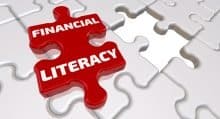 Last week I was blessed to attend the 2019 LINC conference in San Diego. This conference for Registered Investment Advisors is one of the best in the industry, and the wealth of information I was able to gain from its speakers and workshops was priceless. One thing in particular that I heard really impacted me. While discussing wealth building, Robert Herjavec (of TV’s “Shark Tank”) said, “In America there is a language barrier that is at the root of most poverty, and until that barrier is removed the divide between the rich and poor will only get worse.”
Last week I was blessed to attend the 2019 LINC conference in San Diego. This conference for Registered Investment Advisors is one of the best in the industry, and the wealth of information I was able to gain from its speakers and workshops was priceless. One thing in particular that I heard really impacted me. While discussing wealth building, Robert Herjavec (of TV’s “Shark Tank”) said, “In America there is a language barrier that is at the root of most poverty, and until that barrier is removed the divide between the rich and poor will only get worse.”
With Herjavec himself being an immigrant, I expected this comment to be a reference to the large sums of people living in America whose primary language is not English. However, that was not the point he was making. Instead, he said that it is the language of “money” that too many people in the U.S. do not speak. He went on to discuss the importance of understanding how money works, and the power that comes with that knowledge.
For those unaware of his story, Hejavec escaped communist Yugoslavia with his family when he was eight years old. With only a single suitcase, no money and speaking little English, they arrived in Halifax Nova Scotia. He explained that his desire to understand finance really came out of his experiences living in poverty as a boy. He told a particularly moving story that took place when his mother was convinced by a door-to-door salesman to purchase a $500 vacuum for their tiny apartment. The cost of this appliance was roughly seven week’s salary for the family. It was after seeing this poor financial decision that he said he became determined to educate himself about finances so that he, and his family, would never be taken advantage of again.
His story was an all too familiar one, particularly for those living below the poverty line. If you read my columns regularly, you already know I am passionate about personal finance and helping people understand how to make money work for them instead of against them. For nearly a decade I have taught financial literacy courses through various non-profit organizations. At Stewardship Capital I was honored to help develop our “EnCompass” system of financial planning that incorporates not only wise investment management, but also expertise, tools and resources on a wide array of financial matters to provide a more holistic approach to helping our clients achieve their financial goals. Receiving education and behavioral coaching is a huge piece of winning with money. But sadly, it is something many wealth advisors don’t focus on.
A recent survey by Wells Fargo found that four out of five adults say they have never been given an opportunity to learn about personal finance. Is it any wonder then that those who possess this knowledge have a huge economic advantage over those who don’t? According to a study by professor of economics Emmanuel Saez, Americans in the top 10 percent make almost 10 times more than the other 90 percent and that the gap continues to widen. I can’t help but think that there is a strong correlation between these two statistics. It would appear to me that, just as Hejavec said, those who have been educated to use money wisely have a drastically higher likelihood of being wealthy than those who haven’t.
More than any other socio-economic factor, I believe it is this understanding of how money works that has created the large gap between the haves and the have nots. That is why I will continue to use every opportunity afforded to me to provide people with the financial knowledge they need to be successful. The impact this information can have on people’s lives is just too great to not share it. While many politicians in Washington choose to focus on giving hungry people fish, I have learned this it is only through teaching people how to fish, that they will ever be truly filled.
If you would be interested in participating in a free financial literacy class I will be teaching in the near future please reach out to me at lkdavis@stewcap.com for details.
(Advice is general in nature and not intended for specific situations. Past performance is no guarantee of future results.)
